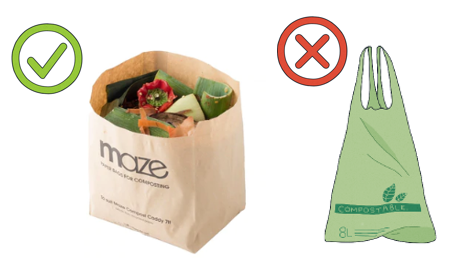Food and garden organics bin
On this page:
What can go in your food and garden organics (FOGO) bin?
Please put only these items in your food and garden organics bin:
- fruit and vegetable scraps
- citrus, onions and garlic
- meat, bones and seafood scraps
- coffee grounds and loose tea leaves
- egg shells
- dairy products
- bread, pasta and cereal
- meal leftovers
- Out of date, inedible food
- leaves, twigs and branches
- grass clippings and weeds, including noxious weeds
- compostable paper bags
- paper towel or newspaper that lines your kitchen caddy
What can't go in your food and garden organics (FOGO) bin?
Thank you for keeping these items out of your food and garden organics (FOGO) bin:
- plastic bags
- compostable or biodegradable plastic bags
- plastic packaging (including compostable or biodegradable packaging)
- food packaging (including cling wrap, ties and stickers)
- garden waste or food waste in plastic bags
- cardboard
- coffee cups
- kitty litter, animal droppings
- Coffee pods or tea bags
- plant pots
- tree stumps, soil and ash
- sharps and medicine
- vacuum dust and hair (including pet hair)
- dishcloths
- wooden icy pole sticks
- nappies and baby wipes (even if labelled compostable)
- shredded paper or used paper towel (use this in your home compost bin or worm farm)
- mixed recycling, glass recycling and general rubbish
Not sure how to dispose of a particular item? Look it up in our A-Z guide to Waste and Recycling.
-
Different councils use different processors with different composting processes. Our food and garden organics facility, Veolia, do not accept compostable plastic bags (even if certified) in the food and garden organics bin as it affects the compost they create.
Some of the challenges Veolia has reported with using compostable plastic bags include:
- There is no standard for what compostable plastic bags look like. This makes them challenging to identify from regular plastic bags during the sorting process.
- People may put the wrong things (contamination) inside the bag which cannot be seen in the sorting process.
- Bagged waste can be a safety risk to people whose job it is, to sort waste materials, particularly if incorrect or unsafe items are placed in the bag.
- If a knot is tied in the bag, the knot can take a long time to break down (in some cases more than one year).
This means that pieces of compostable plastic bags or contaminated materials end up in the compost and mulch products. Understandably, this is unwanted by farmers seeking high-quality compost to use on their farms.
This is why we ask that compostable plastic bags are not used. Veolia service most Councils in the northwest region of Melbourne, so we are not alone in being unable to accept compostable plastic bags.
-
MAZE compostable paper bags are being accepted on a trial basis as part of this 4-bin waste trial.

If you would like to order more MAZE compostable paper bags you can order here.
-
Food waste can smell and attract unwanted pests as it breaks down. There are a few ways you can reduce the likelihood of your FOGO bin smelling bad:
- Wrap food scraps in newspaper or paper towel before putting them in the FOGO bin. As part of the trial, you can also use compostable paper bags.
- Put scraps like seafood and meat in your freezer, and transfer them to your FOGO bin close to collection day.
- Keep your bin in the shade, where possible, and don't overfill it.
- If you have garden waste, line the bottom of your FOGO bin with dry garden waste, leaves, or twigs to stop food scraps from sticking to the bottom. Layer food scraps between garden waste.
- Clean up any spillages on the outside or lip of your bin.
- Wash your bin out from time to time. Or speak to your Owner's Corporation about using a professional bin cleaning service.
-
Food and garden waste thrown into your general rubbish bin ends up in landfill. Food in landfill can create greenhouse gases that contribute to climate change.
In Merri-bek, over 40% of household waste that goes to landfill is wasted food.
Sorting your kitchen scraps and garden clippings into a food and garden organics bin means less of them go to landfill. This means your food scraps can instead be turned into mulch and compost. This helps conserve our valuable resources and minimise greenhouse gases.
-
The food and garden waste collected from your bin is turned into compost and used to enrich soils on regional farms, parks and gardens, making your waste a valuable resource.
Once collected, your food and garden waste is taken to the Veolia organics processing facility in Bulla, Victoria. Here, it takes only six to ten days to turn your food and garden waste into soil conditioner and compost products.
To learn more about the journey of kerbside food and garden waste to compost and how it is used on farms, watch this video or visit the Back to Earth website.